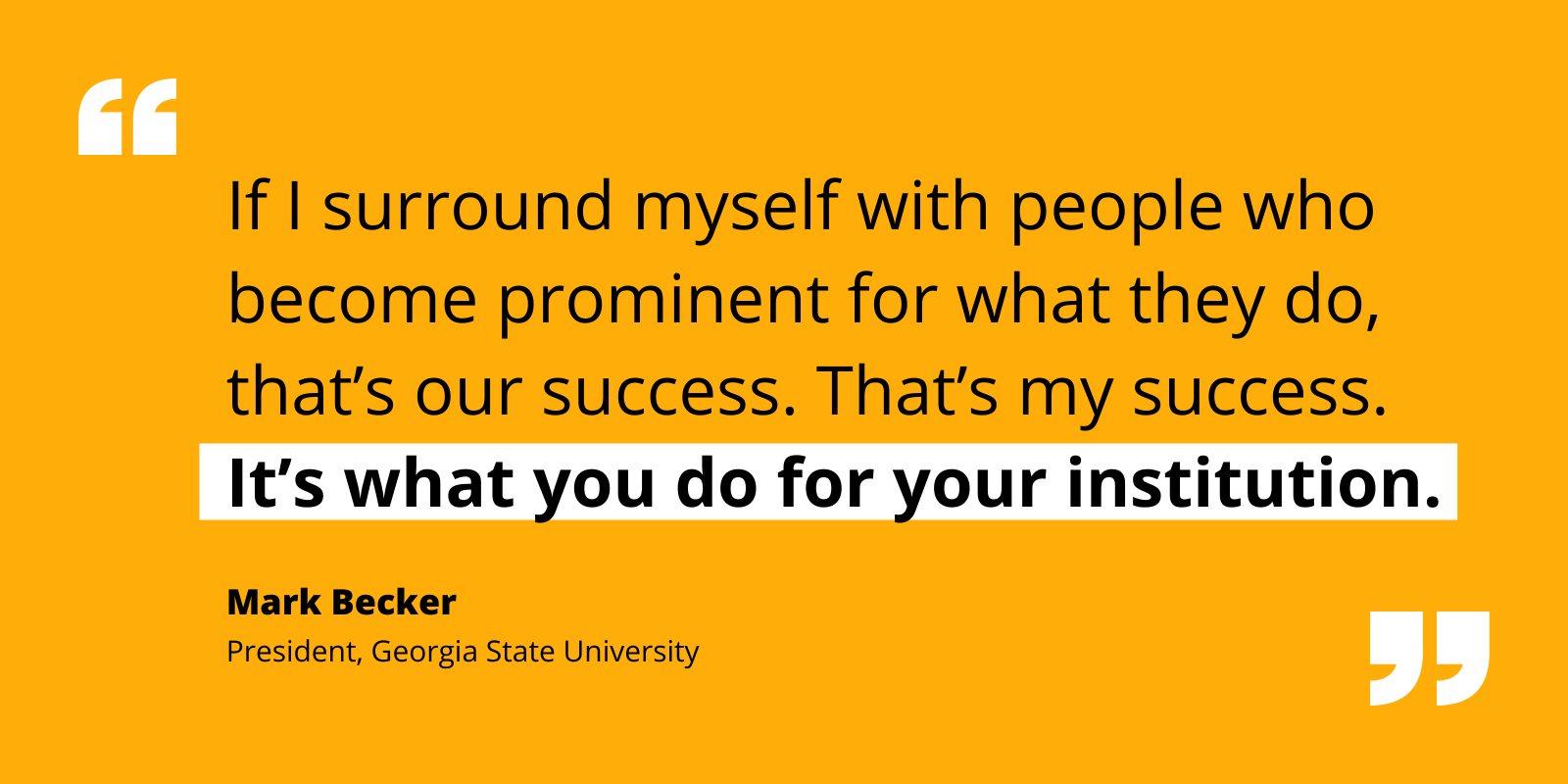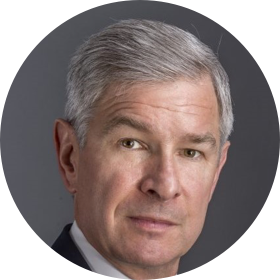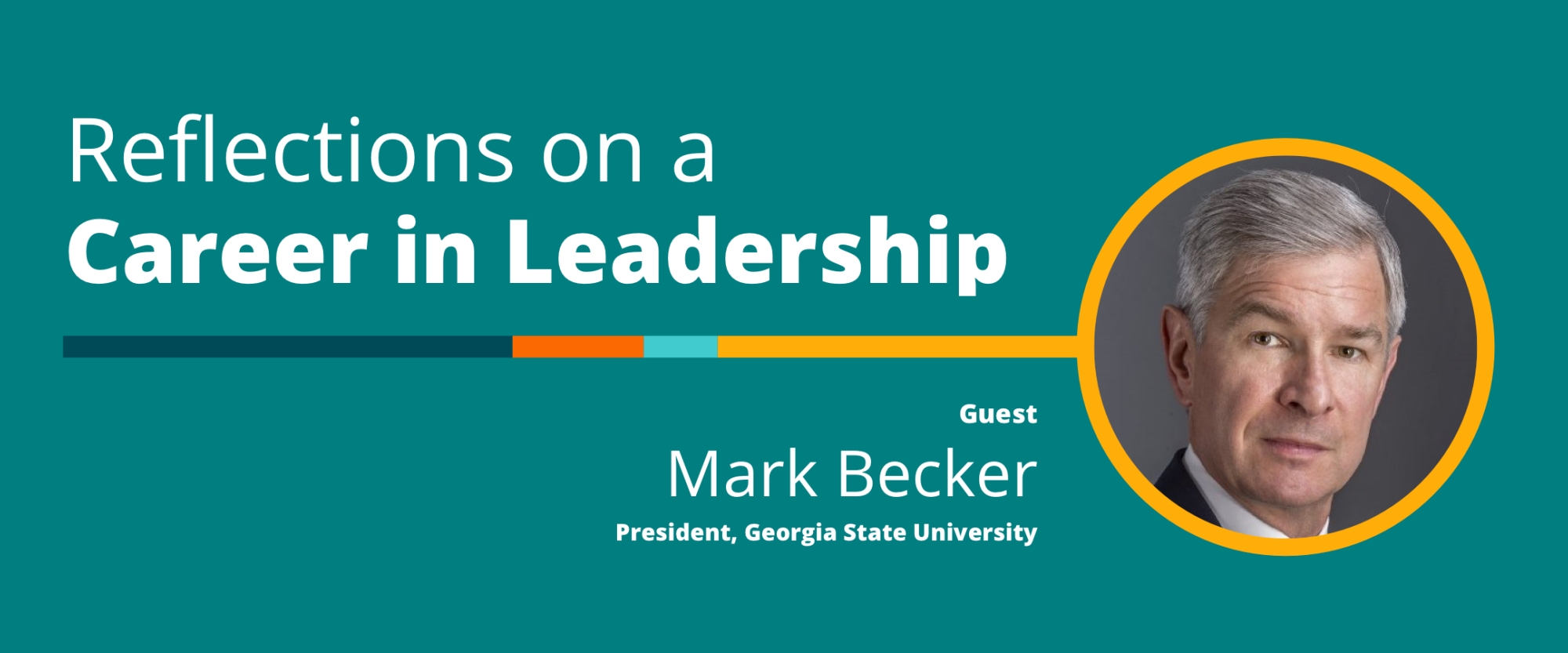Note: This interview in the Weekly Wisdom Series originally aired on May 17, 2021 as part of the University Innovation Alliance’s Innovating Together podcast, appearing live on Facebook, Twitter, and LinkedIn.
At the University Innovation Alliance (UIA), we're proud to begin our second year of the Innovating Together Podcast, created in partnership with Inside Higher Ed. I'm the UIA's Executive Director, and my co-host is Doug Lederman, Editor and Co-Founder of Inside Higher Ed. For our 5/17/21 episode of Innovating Together's Weekly Wisdom series, we checked in with Dr. Mark Becker, President of Georgia State University, who last spoke with us in June of 2020. This time, as Dr. Becker prepared to retire from his long and celebrated tenure, he shared his wisdom about the best mindset for leadership, how elevating the entire institution is a measure of personal success, and the ongoing need for education at any stage in one's career.
How to Prepare for Leadership
Just a few weeks away from stepping down after over 12 years of leadership at Georgia State, President Becker was happy to reflect on experiences and lessons from his tenure.
When we asked how the reality of serving as president first differed from his expectations going into the job, he admitted, "There’s not a lot that surprised me, because I’ve been studying presidents since the mid '90s. When I was an associate professor at the University of Michigan serving on a committee with then-President James Duderstadt, I observed up close the kinds of issues that he was struggling with. I’ve been watching leaders of all types, and I see how way too many don’t make it past the third year – in too many cases, not two years. The big mistake that I’ve tried to avoid all throughout my career is watching presidents make bad judgment based on personal relationships, only to pay a severe price much later, and some of them have been very high profile."
Advice Received and Given
The best professional advice that President Becker ever received came from a U of Michigan colleague shortly before leaving for a dean's position at University of Minnesota. "I expressed my concern about how I would do as a dean relative to the dean that I worked with," he recalled, "the late Noreen Clark, who was an absolutely incredible leader and had skills that I’ll never be able to match. And my colleague said, 'That’s OK, Mark. You don’t have to be her. You have to be you and go off and be true.' So it’s really to be an authentic leader. Be the character you are rather than try to become the character of a title that you have as a model."
He also shared the advice he's given to those just beginning a leadership position. "These jobs are not for people who think it's all about the title and the awards and the speeches and the ceremonies. If you want to be a successful president, be prepared to help your institution continue to evolve and adapt. You have to have the courage of your own convictions, and of course understand the culture of the academy. Have that balance of engaging in shared governance and being a colleague at the same time. You are the chief executive. You have to lead."
Successful Leadership
The UIA has been honored to work with Dr. Tim Renick, Georgia State's former Senior Vice President for Student Success and currently the Executive Director for the National Institute for Student Success (NISS). We noted that President Becker is one of the few leaders we've met who has encouraged someone else at their own institution to develop a significant and possibly competing profile.
"Without question, Tim’s the most sought after speaker in all of American higher education," said President Becker, "and deservedly so. From my point of view, being a servant leader is about accomplishing the mission of your institution. So my job is to surround myself with the most talented people I can find and empower them to have the maximum impact for the institution. I don’t need to have my name in print. In my first year as president, our VP for communications came in all excited about this local newspaper story that was saying nice things about me. I said, "I don’t read that stuff." If I get distracted by what they’re saying about me, I’m going to get off track. So I stay focused on what is the mission and delivering on that. And if I can surround myself with people who become prominent for what they do, that’s our success. That’s my success. The success of a leader is not in making yourself the best person. It’s what you do for your institution, your organization."

The Blind Men and the Elephant
In recent years, leadership has come under fire in every area of public life, and higher ed has certainly seen its share of criticism. We asked President Becker about what some of these critics might be missing in their blanket evaluations.
"It amazes me when I see a newspaper story or a rumor spreading around campus where I know the truth, and the disconnect is so huge," he said. "There’s always this concept of 'they' are doing this, the administration, the government, whoever 'they' may be. And 99 times out of 100, the speculators are way off base. They’re trying to fit a complex world into their mindset, and it’s the parable, the blind men and the elephant. You only understand the part that you can touch, so you have a very different view of what this creature is that you can’t see. What we get with the armchair quarterbacks is they’re trying to put a very complicated, dynamic world into their worldview where they haven’t sat in these seats, where they haven’t seen the political side of this world – I mean the campus, the city, the state, the nation, the interplay between different higher education institutions, the competition for resources."
Learning Never Ends
President Becker believes that the best way of preparing to lead is by reading – a lot. "Read books as well as Inside Higher Ed and some other higher education publications," he suggested. "I begin every day by scanning about five different newspapers on both local and globe. There are also short courses. At one point in my career, I took a course in crisis communications. At another point, I took a course in negotiating. As you travel down the journey, you start to identify where you need to improve and seek education. And the experience is where all that reading and those short courses hit the road, where the rubber hits the road."
This brought the conversation to books, and he shared some recommendations with us. "Probably my favorite is The Contrarian's Guide to Leadership by the late Steven Sample," he said. "I fancy myself as a contrarian leader because wherever the herd is going, it’s probably not the right place, whether you’re an investor in the stock market or the leader of an institution. Another one that I’m very fond of is The Creation of the Future by Frank Rhodes – it’s a little bit dated now, but there’s still a lot of really salient points. So those are two that I’ve relied on over the course of my roughly 20 years from being a dean, provost, and president.
"I’ve read a lot of leadership books," President Becker added, "and a lot of books on organizational change and the like, and I think there’s a lot that transports over. Basically leadership is leadership, but you need to understand the culture, because every industry has its own culture. But if you can demonstrate the ability to work across different types of work cultures and into sector cultures, and you can work in a regulated environment, then leadership is leadership."
Links Mentioned in This Episode
• Georgia State University
• Tim Renick, Executive Director for the National Institute for Student Success (NISS)
• The Contrarian's Guide to Leadership by Steven Sample
• The Creation of the Future by Frank Rhodes
Bios of Guest and Co-Hosts

Guest: Mark P. Becker, President, Georgia State University
Since beginning his tenure as Georgia State University’s seventh president in January 2009, Dr. Mark P. Becker's ambitious vision has led the institution to become one of the nation’s premier urban research universities. He was named one of America’s ten most innovative university presidents in 2015 by Washington Monthly, while Georgia State was ranked third most innovative university in the country by U.S. News & World Report in 2020. G.S.U.'s need- and merit-based scholarship funds have tripled under Dr. Becker's leadership. He launched initiatives to hire exemplary senior faculty, create new research centers, and increase G.S.U.'s global role. He previously served as Executive Vice President for Academic Affairs and Provost at the University of South Carolina, and Dean of the School of Public Health and Assistant Vice President of Public Health Preparedness and Emergency Response at the University of Minnesota. From 1989 to 2000, Dr. Becker was a professor in the Department of Biostatistics at the University of Michigan’s School of Public Health, also holding appointments in the Institute for Social Research and the Department of Statistics, and serving as Associate Dean for Academic Affairs. He has held academic appointments at the University of Washington, the University of Florida, and Cornell University. He is a Fellow of the American Statistical Association and the American Association for the Advancement of Science, and has been principal investigator on research grants from the National Institutes of Health and the National Science Foundation. Dr. Becker attended Harford (Maryland) Community College, earned his bachelor’s degree in mathematics from Towson State University in 1980 and his doctoral degree in statistics from the Pennsylvania State University in 1985.

Co-Host: Bridget Burns, Executive Director, University Innovation Alliance
Dr. Bridget Burns is the founding Executive Director of the University Innovation Alliance (UIA). For the past decade, she has advised university presidents, system chancellors, and state and federal policy leaders on strategies to expand access to higher education, address costs, and promote completion for students of all backgrounds. The UIA was developed during Bridget’s tenure as an American Council on Education (ACE) Fellowship at Arizona State University. She held multiple roles within the Oregon University System, including serving as Chief of Staff and Senior Policy Advisor, where she won the national award for innovation in higher education government relations. She was a National Associate for the National Center for Public Policy and Higher Education, and has served on several statewide governing boards including ones governing higher education institutions, financial aid policy, and policy areas impacting children and families.

Co-Host: Doug Lederman, Editor and Co-Founder, Inside Higher Ed
Doug Lederman is editor and co-founder of Inside Higher Ed. With Scott Jaschik, he leads the site's editorial operations, overseeing news content, opinion pieces, career advice, blogs and other features. Doug speaks widely about higher education, including on C-Span and National Public Radio and at meetings and on campuses around the country. His work has appeared in The New York Times and USA Today, among other publications. Doug was managing editor of The Chronicle of Higher Education from 1999 to 2003, after working at The Chronicle since 1986 in a variety of roles. He has won three National Awards for Education Reporting from the Education Writers Association, including one for a 2009 series of Inside Higher Ed articles on college rankings. He began his career as a news clerk at The New York Times. He grew up in Shaker Heights, Ohio, and graduated in 1984 from Princeton University. Doug and his wife, Kate Scharff, live in Bethesda, MD.
About Weekly Wisdom
Weekly Wisdom is an event series that happens live on Facebook, Twitter, and LinkedIn. It also becomes a podcast episode. Every week, we join forces with Inside Higher Ed and talk with a sitting college president or chancellor about how they're specifically navigating the challenges of this moment. These conversations will be filled with practicable things you can do right now by unpacking how and why college leaders are making decisions within higher education. Hopefully, these episodes will also leave you with a sense of optimism and a bit of inspiration.
Rate, Review & Subscribe
Learn why hundreds of people have rated this new podcast 5 stars! Please join others and rate and review this podcast. This helps us reach and inform more people -- like you -- to help increase the number and diversity of college graduates in the United States.
Click here, scroll to the bottom, tap to rate with five stars, and select “Write a Review.” Then be sure to let us know what you loved most about the episode! Also, if you haven’t done so already, subscribe to the podcast. We’ll be adding a bunch of bonus episodes to the feed and, if you’re not subscribed, there’s a good chance you’ll miss out.

